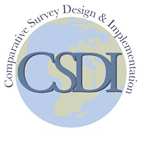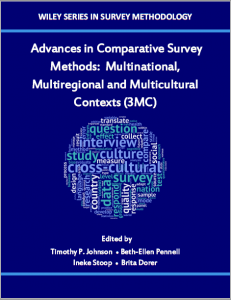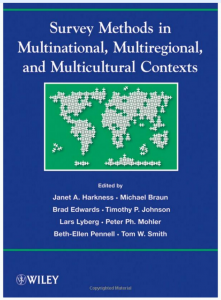- Home
- About us
- Initiatives
- Events
- 2024 CSDI Workshop
- Past Events
- 2023 CSDI Workshop
- 2022 CSDI Workshop
- 2021 Virtual CSDI Workshop
- 2019 CSDI Workshop
- 2018 CSDI Workshop
- 2017 CSDI Workshop
- 2016 3MC Conference
- 2015 CSDI Workshop
- 2014 CSDI Workshop
- Archive
- Forum
- Additional Resources
- Contact Us


We are pleased to announce that the SHARE BERLIN Institute GmbH will host the 2024 CSDI Workshop. The workshop will take place March 18th – 20th at the SHARE BERLIN Institute GmbH in Berlin, Germany.
Call for Individual Abstracts
Below is a list of suggested topics. If your topic is not listed, please feel free to submit a session abstract for any topic that relates to comparative survey design and implementation.
The individual abstracts are due January 5, 2024.
- Equivalency measures
- Achieving comparability
- Questionnaire development and testing
- Translation, adaptation, and assessment
- Minimizing measurement error
- Interviewer effects
- Sampling innovations
- Data collection challenges and solutions
- Quality control
- Innovative uses of technology
- Paradata use across the lifecycle
- Metadata use
- Comparative standard demographics
- Data curation and dissemination
- Comparative analyses
- Computational comparability measures
To submit your abstract (up to 300 words), please use this link: Submit Individual Abstract.
For your convenience, here is a list of important dates:
- January 5, 2024 – Individual abstracts due (session organizers are responsible for ensuring their session participants submit individual abstracts)
- January 15, 2024 – Abstract notification sent, and online registration opens
- March 1, 2024 – Online registration closes
- March 18-20, 2024 – CSDI Workshop
Updating CSDI Database
The Comparative Survey Design and Implementation (CSDI) group is doing a little housekeeping and we are in the process of updating contact information for people who have attended past events (e.g., CSDI Workshops or 3MC Conferences) or who have asked to be added to our email list to receive announcements and updates.
If you would like to continue to receive emails from CSDI, please take a minute (I promise it will only take a minute!) to update your contact information using this form. Please complete the form by December 1st to ensure you do not miss out on future announcements and updates.
Advances in Comparative Survey Methods: Multinational, Multiregional and Multicultural Contexts (3MC)

Since the publication of the last 3MC monograph (2010), there have been substantial methodological, operational and technical advances in comparative survey research. There are also whole new areas of methodological development including collecting biomarkers, the human subject regulatory environment, innovations in data collection methodology and sampling techniques, use of paradata across the survey lifecycle, metadata standards for dissemination, as well as new analytical techniques. This new monograph follows the survey lifecycle and include chapters on study design and considerations, sampling, questionnaire design (assuming multi-language surveys), translation, mixed mode, the regulatory environment, data collection, quality assurance and control, analysis techniques and data documentation and dissemination. The table of contents can be accessed here.
Johnson, T. P., Pennell, B.-E., Stoop, I., & Dorer, B. (Eds.). (2018). Advances in comparative survey methods: Multinational, multiregional and multicultural contexts (3MC). Hoboken, New Jersey: John Wiley & Sons Inc.
Survey Methods in Multicultural, Multinational, and Multiregional Contexts
 Written and edited by experts in the fields, Survey Methods in Multicultural, Multinational, and Multiregional Contexts provides an overview of comparative multinational, multiregional, and multicultural issues in survey methodology. Part of the Wiley Series in Survey Methodology, this volume explores the issue of quality in multipopulation surveys and the level of methodological expertise in comparative survey research. The text, including models of design, multilingual issues, and more on developing countries, is fundamental for statisticians, researchers, and students interested in design and implementation of international, national, and cultural comparative surveys. The text received the 2013 AAPOR Book Award – “recognizing influential books that have stimulated theoretical and scientific research in public opinion; and/or influenced our understanding or application of survey research methodology”. To purchase a copy, please follow this link.
Written and edited by experts in the fields, Survey Methods in Multicultural, Multinational, and Multiregional Contexts provides an overview of comparative multinational, multiregional, and multicultural issues in survey methodology. Part of the Wiley Series in Survey Methodology, this volume explores the issue of quality in multipopulation surveys and the level of methodological expertise in comparative survey research. The text, including models of design, multilingual issues, and more on developing countries, is fundamental for statisticians, researchers, and students interested in design and implementation of international, national, and cultural comparative surveys. The text received the 2013 AAPOR Book Award – “recognizing influential books that have stimulated theoretical and scientific research in public opinion; and/or influenced our understanding or application of survey research methodology”. To purchase a copy, please follow this link.
Harkness, J. A., Braun, M., Edwards, B., Johnson, T. P., & Lyberg, L. E. (2010). Survey methods in multicultural, multinational, and multiregional contexts. Hoboken, New Jersey: John Wiley & Sons.
New and Expanded Cross-Cultural Survey Guidelines
First published in 2008, the Cross-Cultural Survey Guidelines have recently undergone a significant update and expansion (Beta release: July 2016). The new edition includes over 800 pages of content with major updates and the expansion of all existing chapters, as well as the addition of new chapters on study design, study management, paradata, and statistical analysis. More than 70 professionals from 35 organizations contributed to this effort. The senior editor was Tom W. Smith of NORC at the University of Chicago. See: http://ccsg.isr.umich.edu/index.php/about-us/contributions for a complete list of contributors.
The Cross-Cultural Survey Guidelines were developed to provide information on best practices across the survey lifecycle in a world in which the number and scope of studies covering multiple cultures, languages, nations, or regions has increased significantly. They were the product of an initiative of the International Workshop on Comparative Survey Design and Implementation (http://www.csdiworkshop.org/). The initiative was led by Beth-Ellen Pennell, currently the director of international survey operations at the Survey Research Center, Institute for Social Research at the University of Michigan.
The aim of the initiative was to develop and promote internationally recognized guidelines that highlight best practice for the conduct of comparative survey research across cultures and countries. The guidelines address the gap in the existing literature on the details of implementing surveys that are specifically designed for comparative research, including what aspects should be standardized and when local adaptation is appropriate. The intended audience for the guidelines includes researchers and survey practitioners planning or engaged in what are increasingly referred to as multinational, multiregional, or multicultural (3MC) surveys, although much of the material is also relevant for single country surveys.
The guidelines cover all aspects of the survey life cycle and include the following chapters: Study Design and Organizational Structure; Study Management; Tenders, Bids and Contracts; Sample Design; Questionnaire Design; Adaptation; Translation; Instrument Technical Design; Interviewer Recruitment, Selection, and Training; Pretesting; Data Collection; Paradata and Other Auxiliary Data; Data Harmonization; Data Processing and Statistical Adjustment; Data Dissemination; Survey Quality and Ethical Considerations. The guidelines can be found at: http://ccsg.isr.umich.edu. We welcome feedback and suggestions.
Janet A. Harkness Student Paper Award
 The World Association for Public Opinion Research (WAPOR) and the American Association for Public Opinion Research (AAPOR) jointly support Dr. Harkness’s work by sponsoring the Janet A. Harkness Student Paper Award each year. This award recognizes “emerging young scholars in the study of multi-national/multi-cultural/multi-lingual survey research (aka 3M survey research) through support of the winner’s participation in the WAPOR Conference and a cash prize.” Please follow this link to donate to this effort in gratitude for Dr. Harkness’s legacy in the field of cross-cultural, comparative survey research.
The World Association for Public Opinion Research (WAPOR) and the American Association for Public Opinion Research (AAPOR) jointly support Dr. Harkness’s work by sponsoring the Janet A. Harkness Student Paper Award each year. This award recognizes “emerging young scholars in the study of multi-national/multi-cultural/multi-lingual survey research (aka 3M survey research) through support of the winner’s participation in the WAPOR Conference and a cash prize.” Please follow this link to donate to this effort in gratitude for Dr. Harkness’s legacy in the field of cross-cultural, comparative survey research.
Dr. Janet A. Harkness initiated the International Workshop on Comparative Survey Design and Implementation and was one of the driving forces for the Cross-Cultural Survey Guidelines (http://ccsg.isr.umich.edu/). Dr. Harkness passed away in 2012. She inspired and influenced cross-cultural research and work through her steadfast conviction that resources must be made available to researchers and survey practitioners if we are to improve comparative survey research methods, dissemination and analysis.